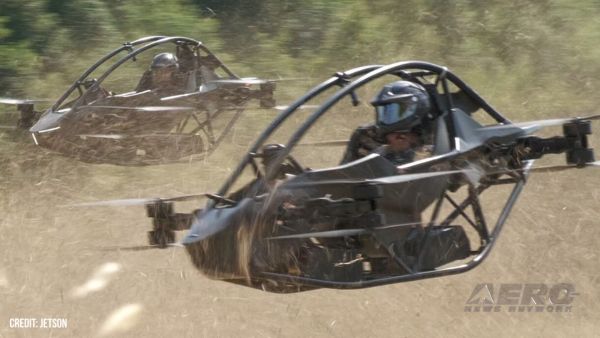Sun, Jul 14, 2019
Will Receive Their Awards Later This Year At A Ceremony In Washington, D.C.
President Trump has named 18 NASA researchers as recipients of the Presidential Early Career Award for Scientists and Engineers (PECASE). These recipients, and 296 other federal researchers, will receive their awards later this year at a ceremony in Washington.

The PECASE Award is the highest honor given by the U.S. government to scientists and engineers who are beginning their research careers. The award recognizes recipients' potential to advance the frontiers of scientific knowledge and their commitment to community service, as demonstrated through professional leadership, education or community outreach.
"These PECASE winners represent some of the brightest early career researchers that NASA supports," said James Green, NASA chief scientist. "They were selected for what they have already accomplished, but more importantly, we expect they will reach even higher goals in the future. They are shining stars."
The following 2019 NASA recipients were nominated by the agency's Science, Human Exploration and Operations, Space Technology, and Aeronautics Research mission directorates, Office of the Chief Engineer, and Office of the Chief Technologist:
- Giada Arney, NASA's Goddard Space Flight Center, Greenbelt, Maryland – for far-reaching influence in predicting, observing, and communicating about habitability and the potential for life beyond Earth
- Laura Barge, NASA's Jet Propulsion Laboratory (JPL), Pasadena, California – for innovative fuel-cell based research
- Jennifer Barilla, Arizona State University, Tempe – for advancing understanding of infectious disease with innovated space-based investigations
- Mark Blenner – Clemson University, Clemson, South Carolina – for pioneering use of synthetic biology
- Lynn Carter, University of Arizona, Tucson – for innovative radar polarimetry and remote sensing
- Shawn Domagal-Goldman, Goddard – for physical models of exoplanets
- Erika Hamden, California Institute of Technology, Pasadena – for innovative leadership in studies of the universe
- Rebecca Kramer, Purdue University, West Lafayette, Indiana – for groundbreaking research on adaptive robots and embedded intelligence
- Gioia Massa, NASA's Kennedy Space Center, Florida – for food cultivation for the International Space Station
- Richard Moore, NASA's Langley Research Center, Hampton, Virginia – for innovative contributions to aerosol-cloud-climate interactions
- Evan Pineda, NASA's Glenn Research Center, Cleveland – for state-of-the-art, multiscale failure analysis code
- John Reager, JPL – for analysis of terrestrial global water cycles
- Jonathan Sauder, JPL – for demonstrating innovative technologies to enable a new class of space missions
- Yolanda Shea, Langley – for pioneering shortwave spectral measurements
- David Smith, NASA's Ames Research Center, Moffett Field, California – for excellence in microbial research in the stratosphere and on the International Space Station
- Kelly Stephani, University of Illinois Urbana-Champaign – for contributions in fundamental high-temperature aerodynamics
- Jennifer Stern, Goddard – for Mars habitability and life detection
- Abigail Vieregg, University of Chicago – for inventing and implementing innovative techniques in neutrino astronomy
The PECASE awards were created to highlight the importance of science and technology for America's future. These early career awards foster innovative developments in science and technology, increase awareness of careers in science and engineering, provide recognition to the scientific missions of participating agencies, and enhance connections between research and challenges facing the nation.
(Source: NASA news release)
More News
“Honored to accept this mission. Time to take over space. Let’s launch.” Source: SecTrans Sean Duffy commenting after President Donald Trump appointed U.S. Secret>[...]
Permanent Echo Radar signals reflected from fixed objects on the earth's surface; e.g., buildings, towers, terrain. Permanent echoes are distinguished from “ground clutter&rd>[...]
Aero Linx: European Hang Gliding and Paragliding Union (EHPU) The general aim of the EHPU is to promote and protect hang gliding and paragliding in Europe. In order to achieve this>[...]
Glider Encountered A Loss Of Lift And There Was Not Sufficient Altitude To Reach The Airport Analysis: The flight instructor reported that while turning final, the glider encounter>[...]
Airplane Climbed To 100 Ft Above Ground Level, At Which Time The Airplane Experienced A Total Loss Of Engine Power On May 24, 2025, at 1300 eastern daylight time, an Aeronca 7AC, N>[...]
 Aero-News: Quote of the Day (07.11.25)
Aero-News: Quote of the Day (07.11.25) ANN's Daily Aero-Term (07.11.25): Permanent Echo
ANN's Daily Aero-Term (07.11.25): Permanent Echo ANN's Daily Aero-Linx (07.11.25)
ANN's Daily Aero-Linx (07.11.25) NTSB Final Report: Schweizer SGS 2-33A
NTSB Final Report: Schweizer SGS 2-33A NTSB Prelim: Aeronca 7AC
NTSB Prelim: Aeronca 7AC



